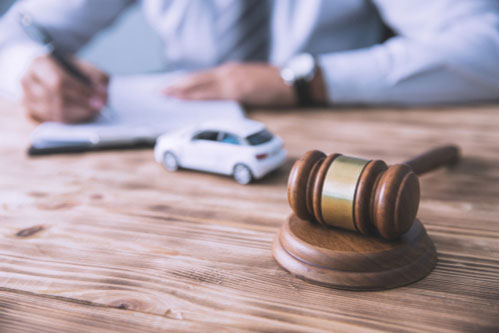- Car Accidents
Founder of Wade Law and expert trial attorney with experience in the courts and in the classroom, lecturing in several courses. Admitted to all of Georgia’s courts and the United States Supreme Court
At Wade Law, we fight for the rights of injured victims in Fayetteville and across Georgia. Our team understands the challenges you face after a car accident, slip and fall, or other personal injury. We take on insurance companies, challenge unfair fault assigned, and work tirelessly to secure the compensation you deserve. With experience in Georgia comparative negligence laws, we know what it takes to build a strong case. If you’ve been injured, we’re here to help.
In Georgia personal injury cases, fault matters. The state follows a modified comparative negligence system, which means that if you are partially responsible for an accident, your compensation may be reduced or denied. Insurance companies often use this rule to minimize payouts, making it critical to understand how comparative fault works. Whether you were in a car accident, slip and fall, or another incident, knowing how Georgia comparative negligence applies can help you protect your claim and secure a fair settlement.
In this blog, we explain Georgia comparative negligence laws, how fault affects compensation, how insurance companies reduce payouts, and why working with an experienced Fayetteville personal injury lawyer can help you secure a fair settlement.
What Is Comparative Negligence in Georgia?
Georgia comparative negligence laws decide who is responsible in personal injury cases. If you were in a car accident, slip and fall, or another incident, your own negligence could reduce the compensation you receive. Understanding how fault is assigned is important when filing a personal injury claim.
Comparative Negligence vs. Contributory Negligence
States follow different rules for determining fault in personal injury cases. Some use contributory negligence, which prevents an injured person from recovering damages if they share any blame. Georgia follows modified comparative negligence, allowing accident victims to seek compensation unless they are 50% or more at fault.
Georgia’s Modified Comparative Negligence System
Georgia law follows a modified comparative negligence rule. If a personal injury attorney proves the other driver or party was at fault, the injured party can recover damages. However, if the injured person is found 50% or more at fault, they cannot recover compensation.
For example, if a jury trial finds that a motor vehicle accident victim is 30% at fault, they can still claim 70% of their total damages. If they are 51% at fault, they receive nothing.
How Fault is Assigned in Personal Injury Cases
To determine fault, insurance companies, attorneys, and courts look at:
- Police reports from the accident scene
- Medical expenses and bills
- Witness statements
- Accident reconstruction expert findings
- Video evidence
A personal injury lawyer gathers this evidence to prove the at-fault driver or responsible party failed to exercise reasonable care.
Why Georgia Comparative Negligence Matters in Your Claim
Understanding Georgia comparative negligence laws helps accident victims know what to expect in settlement negotiations. Insurance adjusters often try to assign more fault to reduce payouts. A personal injury attorney ensures fair evaluation of fault assigned and works to maximize fair compensation.
How Georgia Comparative Negligence Works
Georgia comparative negligence laws determine fault in personal injury cases. This system affects how much compensation an injured party can recover after an accident. Understanding how fault is assigned is key to protecting your rights.
The 50% Bar Rule in Georgia
Under Georgia comparative negligence laws, an injured person can only recover compensation if they are less than 50% at fault. If they are 50% or more at fault, they cannot receive damages. This rule applies to car accident cases, slip and falls, and other personal injury claims.
For example, if a jury trial finds a driver 40% responsible for a Georgia car accident, they can still receive 60% of their damages. If they are 51% responsible, they get nothing.
How Georgia Comparative Negligence Affects Settlements
Insurance adjusters use comparative fault to reduce payouts. If they argue that you share own negligence, your final compensation will be lower. Settlement negotiations often involve proving that the other driver or responsible party failed to exercise reasonable care.
A personal injury attorney challenges fault assigned by insurance companies and fights for fair settlement offers. If the case goes to trial, a jury decides how much fault each party shares.
Why Understanding Georgia’s Negligence System Matters
Knowing how Georgia comparative negligence laws work helps you seek compensation after an accident. If you are partially at fault, your ability to recover damages depends on proving the other party’s negligence. A personal injury attorney can help you build a strong case and protect your rights.
Determining Fault in Georgia Personal Injury Cases
In a personal injury case, proving who is at fault is critical to recovering compensation. Georgia comparative negligence laws assign fault based on evidence and legal standards.
Key Factors in Assigning Fault
Courts, insurance companies, and personal injury lawyers use different forms of evidence to determine fault, including:
- Police reports detailing the accident scene
- Medical expenses and records showing injuries
- Witness statements supporting one side’s claim
- Accident reconstruction expert findings
- Video footage from traffic cameras or nearby buildings
This evidence helps prove if a party failed to exercise reasonable care and caused the accident.
How Georgia Law Defines Negligence
To establish negligence, a claimant must prove:
- The other driver or responsible party had a legal duty to act safely.
- They breached that duty by acting recklessly or carelessly.
- Their actions caused the injured party’s damages.
If the injured person shares own negligence, their final compensation is reduced by their percentage of fault under Georgia comparative negligence laws.
Role of Insurance Companies in Fault Determination
Insurance adjusters review evidence to decide who is at fault. Their goal is to limit payouts by assigning more comparative fault to the injured party. Settlement negotiations often involve disputing the percentage of fault they assign.
A personal injury attorney challenges unfair fault assigned by the insurance company to ensure fair compensation. If necessary, they present sufficient evidence in a jury trial to prove the at-fault driver or other parties involved were primarily responsible.
Why Fault Matters in a Personal Injury Claim
Fault assigned in a Georgia car accident or other personal injury case directly affects how much compensation an injured person can recover. If found 50% or more at fault, they cannot claim compensation. Proving negligence with strong evidence increases the chance of a fair settlement or jury verdict.
Impact of Georgia Comparative Negligence on Your Compensation
In Georgia personal injury cases, the amount of compensation an injured party can recover depends on their percentage of fault. Georgia comparative negligence laws reduce payouts based on fault assigned.
How Fault Reduces Compensation
Under Georgia comparative negligence laws, an injured person can only recover damages if they are less than 50% at fault. If they share partial fault, their final compensation is reduced by their percentage of fault.
For example:
- A jury trial awards $100,000 in damages.
- The injured party is found 20% at fault.
- Their final compensation is reduced by 20%, leaving them with $80,000.
- If they are 50% or more at fault, they receive nothing.
Insurance Companies and Settlement Negotiations
Insurance adjusters often argue that the injured person’s negligence contributed to the accident. Their goal is to shift more fault to reduce payouts. They may:
- Use police reports to highlight own negligence.
- Claim accident victims failed to exercise reasonable care.
- Dispute medical bills or injury severity.
A personal injury lawyer fights against these tactics to ensure a fair settlement.
Maximizing Compensation in a Personal Injury Case
To receive the highest possible compensation, an injured party must:
- Gather sufficient evidence from the accident scene.
- Work with accident reconstruction experts.
- Challenge unfair fault assigned by the insurance company.
A personal injury attorney strengthens claims, proving negligence and securing fair compensation for medical expenses, lost wages, and other damages.
How Insurance Companies Use Comparative Negligence to Reduce Payouts
Insurance companies use comparative negligence laws to limit payouts in personal injury cases. By shifting fault onto the injured party, they can reduce or deny compensation. Understanding these tactics helps protect your claim.
Shifting Blame to the Injured Party
After a car accident or personal injury claim, the insurance company investigates who was at fault. Adjusters review police reports, witness statements, and accident scene evidence to find ways to argue that the injured person was partially negligent. They may claim the injured party was speeding, distracted, or failed to exercise reasonable care. Even small mistakes can be used to assign comparative fault, reducing the amount the insurer must pay.
Reducing Settlement Offers
If the injured party is found partially at fault, the insurance company lowers the settlement offer based on Georgia comparative negligence laws. A claim worth $50,000 may drop to $35,000 if the injured person is found 30% responsible. If the fault assigned reaches 50% or more, the insurer denies the claim entirely. Insurance adjusters use this strategy to save money and pressure accident victims into accepting lower settlements.
Delaying or Denying Claims
Some insurance companies delay claims to wear down the injured party. They may ask for excessive medical records, argue that injuries are pre-existing, or dispute accident scene evidence. These tactics force victims into long negotiations, hoping they accept a lower payout. Without strong legal representation, many people accept unfair settlements just to end the process.
How to Protect Your Claim
To prevent insurance companies from using comparative negligence against you, it is important to gather police reports, medical bills, and witness statements as soon as possible. Avoid giving recorded statements without legal advice, as insurers may use your words against you. A personal injury attorney reviews all evidence, challenges unfair fault assigned, and ensures the injured party receives fair compensation.
Contact an Experienced Fayetteville Personal Injury Attorney Today!
If you’ve been injured in an accident, don’t let insurance companies use comparative negligence to reduce or deny your compensation. At Wade Law, our experienced Fayetteville personal injury lawyers know how to challenge unfair fault assigned, negotiate with insurance adjusters, and present strong evidence to secure the maximum compensation for your injuries.
Contact us at 770-282-1188 for a free case consultation today!










